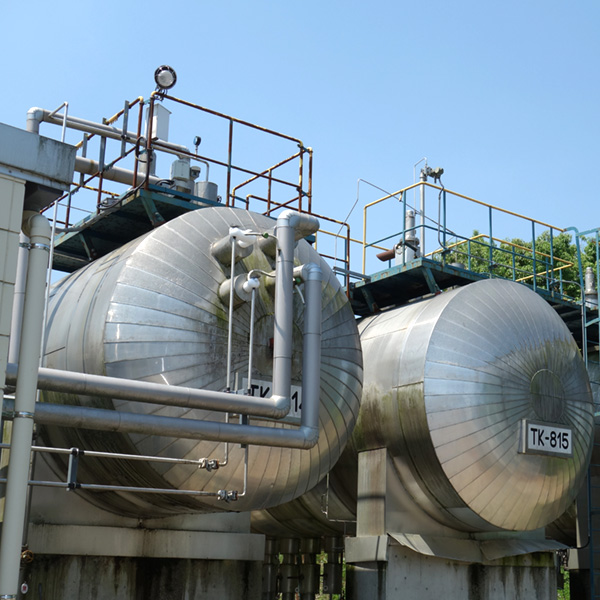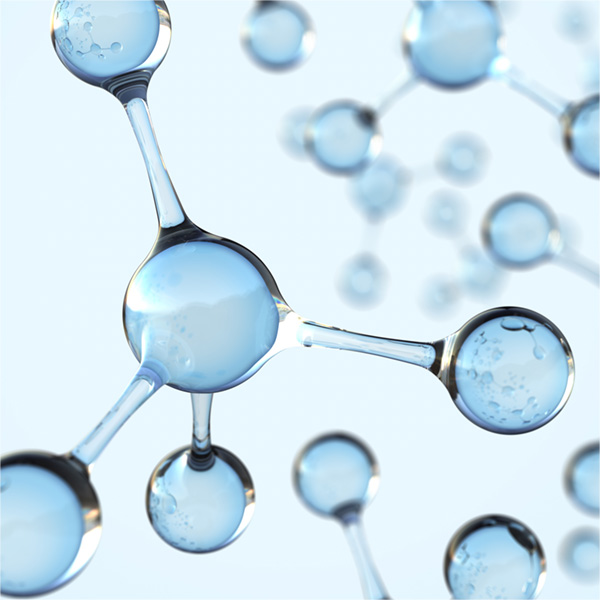
Sustainability
Sustainability
- HOME >
- Sustainability >
- Sustainability >
- Message from the President
Message from the President
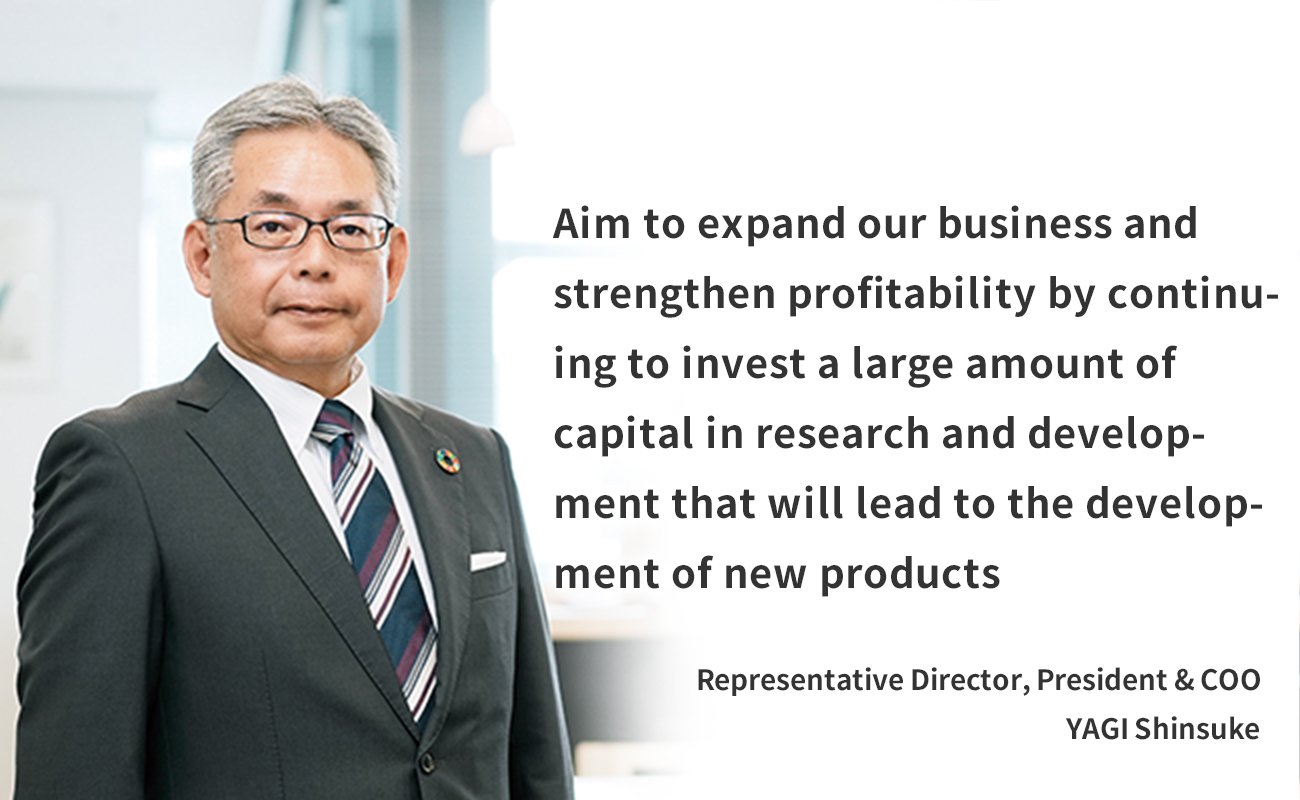
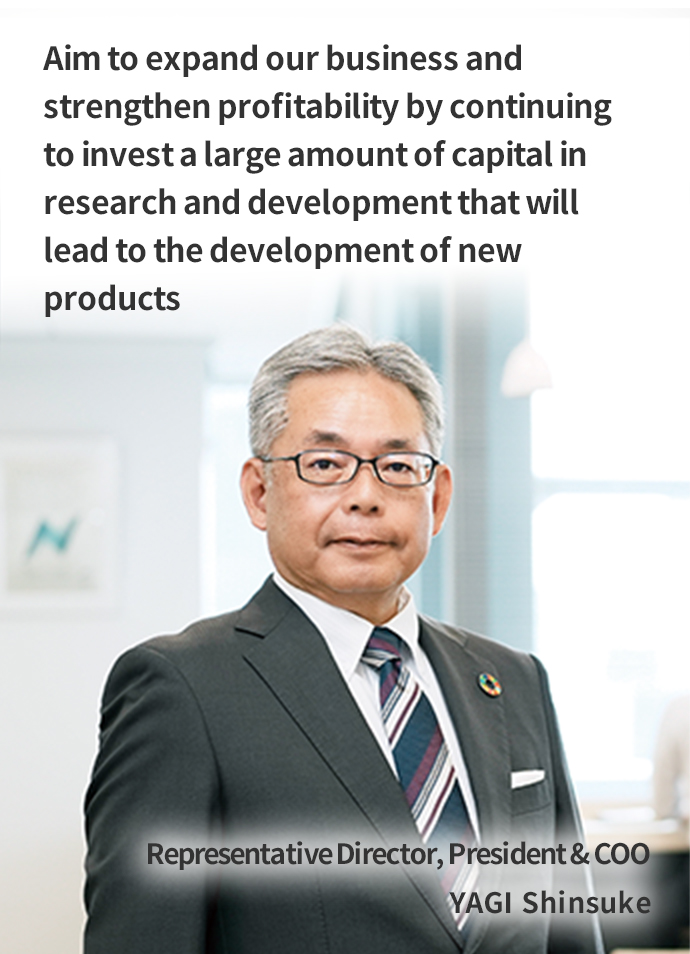
Operating Profit Reached Record High
Performance Materials and Agricultural Chemicals Robustly Drove the Business Performance
It has been five years since I assumed the role of President in 2021. During this time, I have repeatedly reexamined the path forward for Nissan Chemical amid sweeping shifts—structural changes in the global economy, intensifying climate change, rising geopolitical risks, and the accelerating pace of technological innovation. Rather than responding passively to these changes, we have adopted a flexible mindset—seeking to create value that is uniquely Nissan Chemical by accurately identifying emerging trends, preparing for potential risks, and making the most of every opportunity.
Let me begin by reviewing the outcomes of the medium-term business plan “Vista2027 Stage I” (FY2022–FY2024). In FY2024, the final year of Vista2027 Stage I, sales rose 11% year-on-year to ¥251.4 billion, and operating profit increased 18% to ¥56.8 billion. We achieved record highs across all operating profit, ordinary income, and net income. In addition, we met all of our targeted management indicators, including operating margin, Return on Equity (ROE), dividend payout ratio, and total payout ratio.
Currently, our business performance is being driven by two core businesses: the Performance Materials and the Agricultural Chemicals. In the semiconductor materials sector within the Performance Materials, we are benefiting from macro trends such as growing demand for AI and data centers. Leveraging proprietary technologies that are difficult for competitors to replicate, we have established a strong position in niche markets that demand high purity and advanced functionality. As for concerns surrounding the impact of U.S. tariff policies in this area, we currently assess the risk to be limited.
In the Agricultural Chemicals, we have established a robust development framework for high-performance agrochemicals and veterinary drugs, drawing on decades of expertise in organic synthesis and biological evaluation technologies. Products such as herbicides for paddy rice, which deliver strong efficacy with minimal application, contribute to improved operational efficiency and reduced workload for farmers. These innovations deliver both social value and economic performance.
On the other hand, commoditized chemicals are highly susceptible to external conditions, and competition from Chinese companies has eroded our competitiveness in this area. Improving profitability has become a critical challenge. We are actively pursuing cost reductions and a strategic review of our product portfolio.
One of the basic strategies in Vista2027 Stage I—expand market shares and profits of existing businesses—we have made proactive investments. In India, we established a new plant for active ingredients of agrochemicals, which has now commenced operations. In South Korea, we expanded our plant for semiconductor materials. Beyond increasing manufacturing capacity, local manufacturing and R&D capabilities have enabled us to respond swiftly and flexibly to customer needs. In Japan, we built a new plant for our new herbicide VERDAD® at the Onoda Plant and strengthened our product supply capability of high-purity sulfuric acid for semiconductor applications at the Toyama Plant. These initiatives have strengthened our product supply capability in key growth sectors.
We have steadily executed the initiatives outlined in Vista2027 Stage I, and I believe they have yielded many meaningful results. That said, we recognize delays in new product development as a key issue and take this matter seriously.
In light of these circumstances, in FY2025, we launched the medium-term business plan “Vista2027 Stage II” (FY2025–FY2027.) Using a back casting approach, this plan has revisited what Nissan Chemical should look like in 2027 in order to realize the ideal state in 2050 outlined in our long-term business plan “Atelier2050.”
Launch of Vista2027 Stage II
Building Foundation for Continuous Growth and Stable Earnings
In Vista2027 Stage II, we have identified “the creation of new products” as our highest priority. To support this, we have established three basic strategies: expanding profits in existing businesses, developing new products looking toward 2030, and strengthening business foundation. While securing short-term growth, we are steadily executing forward-looking strategies to build a foundation for continuous growth and stable earnings.
We remain committed to our financial indicator of maintaining ROE of 18% or more. We are now utilizing the newly disclosed Return on Invested Capital (ROIC) figures for each business segment not merely as performance targets, but as effective management metrics that underpin sustainable growth across the organization. This supports the development of a management framework that places greater emphasis on quantitative evaluation and accountability.
We are committed to being a company that earns and sustains trust by creating and delivering high-value products for our customers and for the society of the future—building on the strengths we have cultivated over the years as a chemical company. To that end, we will move forward step by step, taking new challenges and driving transformation.
Expanding Profits in Existing Businesses
Strengthening Competitiveness Through Strategic Investment Based on Proprietary Technologies
Nissan Chemical’s current position is the result of a series of deliberate strategic decisions made over time. In particular, our withdrawal from the petrochemical business in the late 1980s and our transformation into a value-creating company focused on creating high-value-added products through research and development (R&D) reflect a clear commitment to “identifying our core strengths and concentrating management resources in those areas.” Under this policy of “selection and concentration,” we have allocated management resources to the specialty chemicals where proprietary technologies enable us to establish competitive advantages—and we have pursued a strategy to secure dominant market share in these fields.
Under the first basic strategy of Vista2027 Stage II—expanding profits in existing businesses—we are strengthening our focus on growth areas. To balance profitability and growth, we have committed to concentrating management resources in the Performance Materials and the Agricultural Chemicals businesses, clearly signaling the strategic direction Nissan Chemical aims to take going forward. This focus extends beyond capital expenditures to include targeted allocation of human resources.
In the Performance Materials business, we will expand sales of semiconductor materials. At the same time, we will focus on the development of next-generation materials and acquire adoption from customers, driving both revenue and profit growth.
In the Agricultural Chemicals business, we will expand our sales areas in overseas markets, while accelerate the development of new pesticides, veterinary drug, and biological pesticides. Regarding the veterinary drugs, we have extended our long-term supply agreement with MSD Animal Health, the animal health division of Merck & Co., Inc. (U.S.), for fluralaner—an active ingredient used in treatments for fleas and ticks. In addition, we have initiated joint R&D aimed at creating new veterinary drugs.
To achieve significant business expansion in the future, I believe it is essential not only to grow our existing product lines but also to generate synergies through strategic investments, including M&A. In particular, in the semiconductor and display sectors—where competition in the Chinese market is intensifying—swift and strategic investment is critical to maintaining and strengthening our competitiveness. I believe that Nissan Chemical remains in a growth phase. We are committed to making the necessary investments to support that growth.
In addition to strengthening growth areas, our first basic strategy also focuses on improving profitability in the Chemicals business. Specific measures include downscaling the manufacturing capacity for TEPIC® by half, optimizing capital expenditures through leveraging outside manufacturing contractors, and discontinuing unprofitable products. Through these initiatives, we aim to establish the structure to secure a stable profit over 5% of the operating profit margin from FY2027 onward.
In the Healthcare business, we are working to expand sales and accelerate development of generic active pharmaceutical ingredients (APIs), while advancing the pipeline of new pharmaceuticals—particularly oligonucleotide drug discovery. In the development of new APIs and products, we are enhancing CDMO business through manufacturing technologies and development capability for highly potent APIs and peptides.
Developing New Products Looking Toward 2030
Accelerating the Creation of New Products
The creation of new products is one of our most critical priorities for achieving sustainable growth. Under Vista2027, we have clearly set the goal of creating innovative new products, in addition to ensuring stable growth in existing businesses.
To accelerate selection and concentration in new product development, we reorganized our Planning and Development Division in April 2025. By establishing dedicated groups for each development theme—such as LiB materials, optical interconnect materials, thermal management materials, and energy materials—we have clarified targets, missions, and responsibilities. I believe that making prompt decisions on whether to continue or discontinue development will be a key factor in determining the success of future innovation.
What is required here is “discernment abilities”—determining which research themes have market viability and how far they should be pursued. Cultivating talent capable of making these judgments will be a key driver of our future growth. We are also working to instill a business mindset among our researchers, fostering a culture in which they consider the exit strategy and market value of their work. That said, deciding to halt an ongoing development project is extremely difficult and demands sound judgment. I believe it is the responsibility of management—and my own personal duty—to make those decisions.
Customer-Driven Development: Field-level Collaboration Between Researchers and Sales
Establishing our own development framework
One of our greatest strengths is the close collaboration between R&D and sales, which allows us to develop products with a deep understanding of customer needs. In the Performance Materials business, researchers visit customers alongside sales representatives to gather direct feedback on products under development. This hands-on engagement drives demand-led product improvements and inspires new development themes. This customer-driven development framework has long been part of our corporate culture. Researchers engage directly with customer sites, witness challenges firsthand, and propose technical solutions. This cycle of innovation drives the creation of high value-added products.
We have established R&D hubs not only in Japan, but also in South Korea, Taiwan, and Suzhou, China—building a framework that enables timely responses close to our customers. While we were once seen as slow to respond in overseas markets, we are steadily building our global competitiveness through faster decision-making and enhanced customer engagement.
I also consider our strength in collaboration to be one of our core advantages. While our business operations may be vertically structured, our technical foundation enables seamless collaboration across diverse fields—including semiconductors, displays, agrochemicals, and pharmaceuticals. This strength is rooted in shared technologies such as fine organic synthesis and biological evaluation, supported by fluid talent mobility and a flat, open technical culture. Thanks to this flexible organizational structure, we are able to share and apply insights across disciplines, leading to the creation of new value.Strengthening our Business Foundation
Driving Sustainable Growth Across the Group
As a company built on R&D, we recognize diversity in human resources is a critical driver of sustainable growth. Currently, Nissan Chemical employs approximately 500 researchers, of whom 18–20% are women. In recent years, women have accounted for around 30% of new graduate hires in research roles. Opportunities for women to thrive are steadily expanding.
I believe that increasing the number of female researchers enhances the vitality of our organization and strengthens our responsiveness to emerging social needs—such as environmental challenges—through diverse perspectives and flexible thinking. I also anticipate that the pioneering spirit demonstrated by female researchers will positively inspire their male counterparts, fostering an organizational culture where women and men elevate one another.
In 2024, with the aim of promoting our diversity-related initiatives such as increasing the ratio of women in managerial positions, we have strengthened our promotion system by establishing the Diversity Promotion Subcommittee as a subordinate organization of the Sustainability Committee. While we already have female outside directors, it is equally important to cultivate female leaders from within the organization. We are actively implementing leadership programs for women and developing future executive talent in line with our succession planning. Based on the concepts of “barrier-free organization” and “open communication,” we aim to revitalize the organization by demonstrating a spirit of challenge regardless of gender and stimulating each other.
In our recruitment process, candidates undergo technology-focused interviews conducted directly by executive officers and department managers. This approach enables us to identify individuals with strong motivation for research and technology.
We are particularly seeking highly specialized talent with the ability to generate business value. Our goal is to expand our talent pool in emerging core technology areas such as information science and microbial control, which we aim to acquire as new core technologies. To secure this talent, we are actively pursuing both new graduate and medium-career hiring.
Addressing Environmental Challenges as a Responsibility of Chemical Company
Advancing Carbon Neutrality and Biodiversity Conservation
I recognize that, as a chemical manufacturer, we have a responsibility to take concrete actions toward achieving carbon neutrality and becoming nature-positive.
We have set a clear target to reduce greenhouse gas (GHG) emissions, including carbon dioxide, by more than 30% by FY2027 compared to FY2018. To meet this goal, we are steadily advancing technology development and process improvements. Although our business operations are not inherently high emitters of GHGs, we are actively working to reduce emissions through improvements in manufacturing processes and the introduction of renewable energy. As Chair of the Climate Change Committee, I am leading this initiative at the executive level.
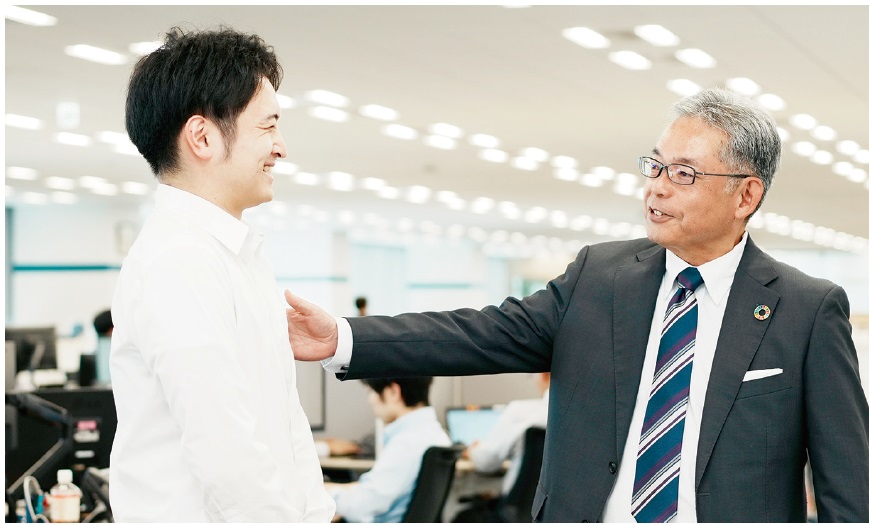
In addition, in FY2024, we developed a roadmap to achieve carbon neutrality by 2050 for our Scope1+2 emissions. Regarding Scope3, we have already disclosed our emissions data. To begin addressing reductions in Category 1—the largest source of Scope3 emissions—we have initiated a survey of GHG emissions among our suppliers to gain a clearer understanding of the current situation. While specific measures for Scope3 reduction are still under consideration, we recognize this as a critical issue and will reflect it in our future initiatives.
Climate change presents not only a business risk, but also an opportunity. For example, as global warming progresses, the role of our agrochemicals is becoming increasingly important. We are also exploring new business domains related to water resources and water treatment. Our founding philosophy is rooted in the idea of “protecting agriculture,” and we will continue to position the agricultural sector as a core business. Building close relationships with farmers will be key to our future growth. We aspire to be a company that views climate change both as a social challenge and as a catalyst for growth—and responds proactively to both dimensions.
Coexistence with nature is inseparable from our business activities. For this reason, we have identified biodiversity conservation as a material factor and established Bio-Parks at our five plants. Through these initiatives, employees across the Nissan Chemical Group are deepening their understanding of how our business activities both benefits from and impacts natural capital, including biodiversity. At the Toyama Plant in particular, we have developed the 2.5-hectare Nissan Bio-Park Nishi-Hongo in collaboration with local residents. This biodiversity space—centered around waterfront and community-based forests that support rich habitats for flora and fauna—also serves as an educational environment where local children can learn about nature.
These initiatives are not simply part of our corporate social responsibility, but are embedded in our business activities as an integral component of our sustainability strategy. In April 2024, we registered with the Taskforce on Nature-related Financial Disclosures (TNFD) Adopter, an international framework for nature-related information disclosure. We disclosed information in line with TNFD recommendations and are working to translate the perspectives on how natural capital is understood and valued into more concrete business decisions.
Our company is built on a foundation of biological evaluation technologies and agricultural business. I believe that harmonizing with nature can be elevated into a source of business value—and this represents a unique competitive advantage for Nissan Chemical.
We are committed to addressing social issues such as ESG with sincerity and will further accelerate our sustainability initiatives. Deepening our environmental management is essential to realizing a sustainable society.
Leveraging Diverse Perspectives from Outside Directors to Strengthen Governance and Effectiveness of the Board of Directors
Sound corporate governance is the foundation for enhancing corporate value and is essential to achieving sustainable, medium- to long-term profit growth. To improve the effectiveness of the Board of Directors, we have appointed outside directors with diverse backgrounds, thereby reinforcing the Board’s supervisory function over management.
Our current outside directors bring high-level expertise and practical experience in areas such as corporate management, legal affairs, and R&D. In addition to participating in meetings of the Board of Directors, they actively engage in research and technology presentations, as well as executive discussions held several times a year. Prior to each meeting of the Board of Directors, we provide detailed briefings on agenda items, including the background and context, enabling constructive and well-informed discussions. Board effectiveness is assessed annually through self- assessment by the Board of Directors itself. To ensure neutrality and objectivity, we conduct a third-party evaluation every three years through an external organization with no conflict of interest. The results of both evaluations are used to identify improvement themes for the following year.
In FY2024, the Board of Directors and executive discussions engaged in deep dialogue on fundamental management issues—such as why new products are not reaching the market—as well as the formulation of our medium-term business plan. In addition, the sharp insights of the outside directors and Audit & Supervisory Board members are actively incorporated into management decisions, particularly in areas such as risk assessment for overseas investments and the prioritization of research themes.
Make Things Happen
Pursuing Both Economic and Social Value
With the launch of Vista2027 Stage II this fiscal year, I shared the message to employees, “Make Things Happen.” with our employees. Embracing change, boldly tackling challenges, and achieving valuable and tangible outcomes—this steady accumulation of effort is what I believe will propel Nissan Chemical into the future.
The Nissan Chemical Group will continue to unite internal and external strengths and take on new challenges with passion toward sustainable growth and enhanced corporate value, guided by our corporate slogan: “WHERE IT ALL BEGINS.” Through these efforts, we aim to contribute to solving social issues and realizing a sustainable society in harmony with the global environment. We remain firmly committed to achieving our medium-term business plan, Vista2027. We sincerely ask for the continued understanding and support of all our stakeholders.
